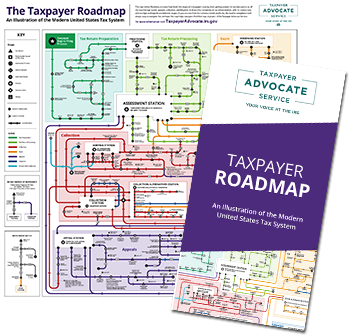Published: | Last Updated: February 4, 2022
Letter 4383
Collection Due Process/Equivalent Hearing Withdrawal Acknowledgement
View our interactive tax map to see where you are in the tax process. It could help you navigate your way through the IRS.
View our interactive tax map to see where you are in the tax process. It could help you navigate your way through the IRS.

This is a 30 day notice, please enter the date of your notice so we can help you determine how much time you have left to pay
This letter is issued by the Appeals Office of the IRS acknowledging they received your withdrawal request for a Collection Due Process (CDP) or Equivalent Hearing (EH).
This notice or letter may include additional topics that have not yet been covered here. Please check back frequently for updates.
Appeals has received your CDP or EH withdrawal request because you have reached a resolution or agreement with the Internal Revenue Service regarding the tax periods on the CDP/EH hearing request or you are satisfied that you no longer need a hearing with the Office of Appeals. By submitting this form, you withdraw your hearing for lien, levy, or both.
By withdrawing a CDP request, Appeals will not verify that all legal and administrative requirements were met for the periods listed on the original appeal request. You will also give up your right to go to the U.S. Tax Court. When the CDP is withdrawn, levy action is no longer suspended and the Collection Statute Expiration Date (CSED) is no longer suspended.
By withdrawing an EH the IRS will not make a decision or determination on your hearing request however you are not giving up any other appeal rights you may be entitled to, such as an appeal under the Collection Appeals Program (CAP).
You have a balance owed on our tax account. The IRS has either issued you a notice of intent to levy with appeal rights or filed a Notice of Federal Tax Lien (NFTL). You have exercised your appeal rights and either made a timely request for Collection Due Process CDP or made a request for a Collection Due Process (CDP) hearing after the due date for a timely hearing and you were entitled to an Equivalent Hearing (EH) within the 1-year period with the Appeals Office of the IRS.
Process: Face to Face or Telephone Conference on CDP/EH line or; Process: Appeals Considers: Were all administrative legal requirements followed, Collection Alternatives, Innocent Spouse Relief, Balancing Test – whether governments interest in efficiently collecting tax is no more intrusive than necessary.
you can contact the person shown at the top of the letter.
such as an installment agreement or offer in compromise, you’ll need to make payments based on your agreement with the IRS. You’ll also need to stay current in filing and paying your taxes during the time of the agreement, and if you enter into an offer in compromise, for five years after the IRS accepts your offer.
you could review information regarding enforcement actions:
You could also review information regarding collection alternatives and resolutions:
If you think you’ll have trouble paying your taxes or the NFTL filing will cause economic hardship, it’s helpful to know what your options are to address your tax debt.
IRS.gov has resources for understanding your notice or letter.
Browse common tax issues and situations at Get Help.
If your IRS problem is causing you financial hardship, you’ve tried repeatedly and aren’t receiving a response from the IRS, or you feel your taxpayer rights aren’t being respected, consider contacting the Taxpayer Advocate Service (TAS).
You may be eligible for representation from an attorney, certified public accountant (CPA), or enrolled agent (EA) associated with a Low Income Taxpayer Clinic (LITC). LITCs also provide information about taxpayer rights and responsibilities in different languages for individuals who speak English as a second language.